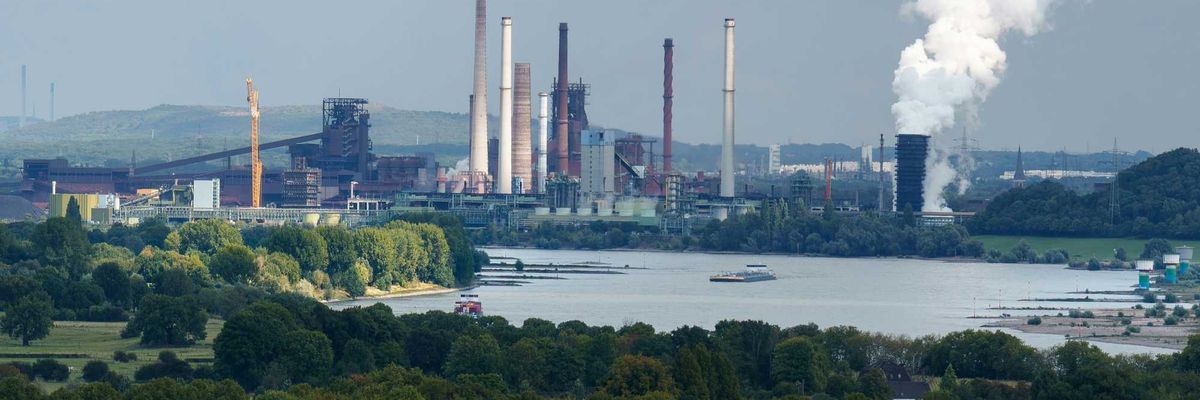wind energy
Wind turbine failure raises concerns over offshore energy
A broken wind turbine blade in Massachusetts has triggered safety and cost concerns in the U.S. offshore wind industry, which is already struggling with delays and rising expenses.
In short:
- A 300-foot-long wind turbine blade failed at Vineyard Wind 1, delaying the $4 billion offshore project.
- The failure has added to existing challenges such as cost overruns, safety concerns, and supply chain issues, slowing offshore wind development.
- GE Vernova, the turbine's manufacturer, cited a manufacturing error, and other recent failures raise questions about quality and oversight in the offshore wind industry.
Key quote:
"All these small boats could be subject to damage. Everyone wants this green legacy, but at the cost of what?"
— Peter Kaizer, fisherman
Why this matters:
Offshore wind energy is key to meeting climate goals, but failures like this one increase costs and slow progress. These challenges, combined with opposition from fishing communities, may delay the transition to clean energy along the East Coast.
Read more: New England turns to offshore wind for cleaner energy
Wind turbine blades could soon be recyclable
Researchers have developed a new plant-based material for wind turbine blades that could help address the growing waste problem caused by old turbines.
In short:
- Wind turbine blades are difficult to recycle and often end up in landfills, contributing to environmental waste.
- A new plant-based material can be recycled and potentially used as a direct replacement in manufacturing without changing existing production processes.
- Economic pressures and higher production costs could hinder the widespread adoption of this new recyclable material.
Key quote:
It’s "designed to be a drop-in replacement. Manufacturers should be able to just take it and use it.”
— Robynne Murray, researcher at the National Renewable Energy Laboratory
Why this matters:
As wind power grows, the disposal of old turbine blades could contribute to significant landfill waste. A recyclable alternative would reduce this environmental burden and support the transition to cleaner energy sources.
Wind farms often face community resistance due to slow, complex benefits
Community opposition and misinformation slow the progress of wind farms despite potential economic benefits.
Mary Katherine Wildeman and Melina Walling report for The Associated Press.
In short:
- Community members in Greeley County, Nebraska, opposed a proposed wind farm, citing concerns about property values and environmental impact.
- Economic benefits of wind farms, including millions in taxes and lease payments, often fail to sway public opinion due to mistrust and misinformation.
- Local laws blocking wind projects are becoming more common, further complicating the adoption of renewable energy.
Key quote:
“Every fear, every misinformation that you can imagine gets put on the barn wall. We have rural communities who are going out of their way to pursue agendas that are counterproductive to their own interests.”
— John Hansen, president of the Nebraska Farmers Union and advocate of wind power
Why this matters:
Community resistance to wind farms can stall renewable energy projects, impacting efforts to combat climate change. Understanding and addressing local concerns is crucial for sustainable development.
New England turns to offshore wind for cleaner energy
New England is heavily investing in offshore wind energy to reduce its reliance on natural gas and meet future power demands from electrification.
In short:
- New England's push into offshore wind aims to address concerns about its dependency on natural gas and limited pipeline capacity during extreme cold.
- The Revolution Wind project, delivering energy to Rhode Island and Connecticut, marks significant progress in the offshore wind sector.
- Challenges include supply chain issues, local opposition, and the need for major grid upgrades to handle increased and variable power from wind turbines.
Key quote:
“They can build and design this, it’s really about time, money and the will to do that. The timing piece is the part we’re most concerned with.”
— John Moura, director of reliability assessment at NERC
Why this matters:
Advocates say transitioning to offshore wind is vital for New England's clean energy goals — but it requires overcoming logistical and regulatory hurdles. Success will impact energy reliability and the region's ability to meet rising power demands sustainably.
Glauconite disrupts offshore wind plans
A green mineral called glauconite is causing problems for President Biden's offshore wind initiatives by complicating the installation of wind turbines.
In short:
- Glauconite forms a sticky, clay-like layer when disturbed, obstructing the installation of monopiles, which are essential for offshore wind turbines.
- At least four offshore wind projects in New England and New York have been affected by this mineral, threatening their efficiency and economic viability.
- The U.S. Geological Survey and wind developers are researching the extent of glauconite deposits and potential solutions to this issue.
Key quote:
“Our administration has been laser focused on making what many of us thought impossible — a thriving and sustainable domestic offshore wind industry from coast to coast.”
— Interior Secretary Deb Haaland
Why this matters:
Glauconite is hampering efforts to meet ambitious renewable energy targets. The discovery of glauconite in key offshore wind areas also sparks concerns about the ecological impact of extensive drilling and construction activities. Balancing the urgent need for renewable energy with the preservation of marine ecosystems is a delicate task. Scientists and environmental advocates stress the importance of thorough impact assessments and the development of eco-friendly installation methods.
UK: Nigel Farage to run for MP, pledging to oppose climate policies
Nigel Farage, leader of Reform UK, has announced his candidacy for MP, emphasizing his opposition to climate action and net zero policies.
In short:
- Nigel Farage is standing for MP and will lead Reform UK, succeeding Richard Tice.
- Farage has consistently opposed climate action, calling for a referendum on the UK's net zero emissions target.
- Reform UK's anti-climate policies reflect Farage's views, including skepticism of climate science and support for fossil fuels.
Key quote:
“I think wind energy is the biggest collective economic insanity I’ve seen in my entire life. I’ve never seen anything more stupid, more illogical, or more irrational.”
— Nigel Farage, leader of Reform UK
Why this matters:
Farage's candidacy and leadership of Reform UK could amplify anti-climate policies in Parliament, challenging the UK's climate commitments. This stance contrasts with public support for renewable energy and climate action, potentially influencing future environmental policies.
Trump's return could severely impact Biden's wind power initiatives
A potential Trump presidency poses a significant threat to the progress of the offshore wind industry and clean energy transition.
In short:
- Trump's previous presidency saw a stagnation in offshore wind development, raising concerns about future setbacks.
- His criticism of wind power, including unfounded health claims and economic impacts, could hinder clean energy progress.
- The Biden administration's efforts to boost offshore wind projects face potential reversal under Trump's influence.
Key quote:
“If you have a windmill anywhere near your house, congratulations your house just went down 75 percent in value.”
— Donald Trump, 2020 speech
Why this matters:
Trump's potential return to office could dramatically alter the course of the U.S.'s energy future, impacting efforts to reduce greenhouse gas emissions and transition to sustainable energy sources.
Be sure to read Peter Dykstra’s 2022 piece: Headwinds remain for clean energy









